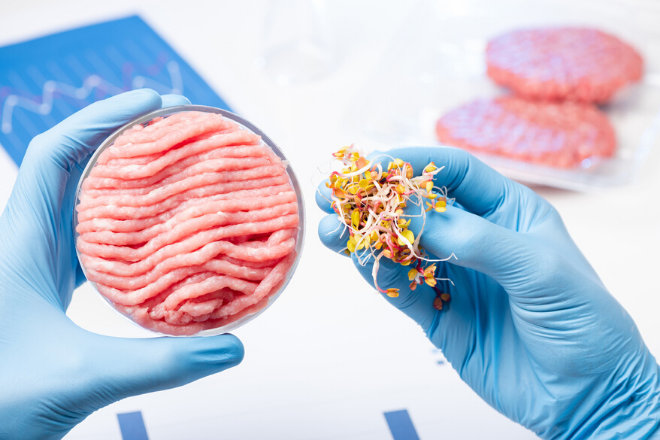Article by Jessica Holler, SAGE Dining Services
Alternative meat products have proliferated. Different from traditional meatless options, such as black bean burgers or soy hot dogs, these new alt proteins, with names such as Beyond Meat® and the Impossible™ Burger, have shown up in restaurants, grocers’ freezers and maybe even your school’s lunch menu. They have been backed by venture capital and celebrity endorsements, but are they worth all the hype? And importantly for schools, do they pose a risk to those with peanut allergies?
The Beef With Alt-Beef
Alt protein companies’ goal is to simulate the meat-eating experience and thereby encourage omnivores to reduce their animal protein consumption. The new products use pea, potato, wheat and/or soy proteins, along with coconut or palm oils, to mimic the taste and feel of animal protein. To make these products “bleed,” manufacturers use beet juice, pomegranate or a plant-based heme that’s been engineered through synthetic biology. Currently substitutes for ground beef, sausage and chicken nuggets are available, and the field is growing. Up next are other types of synthetic chicken, pork, eggs and fish as well as products made from a mix of meat and plant proteins, cultured meat made from animal stem cells and 3D-printed synthetic meats.
Research shows that eating less meat and more plant-based foods will benefit the environment and human health. On top of this, with an expanding population competing for a finite amount of arable land, growing animals solely to consume their protein seems inherently less efficient than just consuming the vegetable protein directly.
The question remains, however: will eating alt proteins benefit the earth? Alt-protein production generates fewer greenhouse gases and uses less energy, water and land than is required for beef but more than simply producing a bean burger. Further, the palm oil and coconut oil used in the alt-protein products — one of the top five ingredients — has led to an expansion of plantations and increased deforestation.
Allergens Alert
For schools, the most immediate concern may be that the products have potential repercussions for those with food allergies. To mimic the look, taste and smell of meat, alt proteins use what are called heme substitutes, a type of protein. Food allergies are in effect reactions to proteins, and the heme-substitute proteins in alt protein could cause allergic reactions and initially raised concerns at the FDA. In July 2019, however, the FDA approved the heme substitute as safe, based on research completed by Impossible Foods.
Several alt-protein varieties carry a special warning urging caution for those with a severe peanut allergy because alt proteins contain pea proteins. Both peas and peanuts are legumes, and it’s estimated that 5% of people with peanut allergies may experience cross-reactivity, even if they’ve never had problems with peas before. This is because the pea protein in these manufactured products is highly concentrated.
Ultimately, it’s too soon to assess the long-term impact of these synthetic products for both the environment and humans. Research will eventually catch up to the market, but for now, it’s up to each person to decide whether alt proteins have a place on their plates. If your community wants to try the new manufactured foods, higher cost and limited availability may create challenges, but can likely be sourced.



